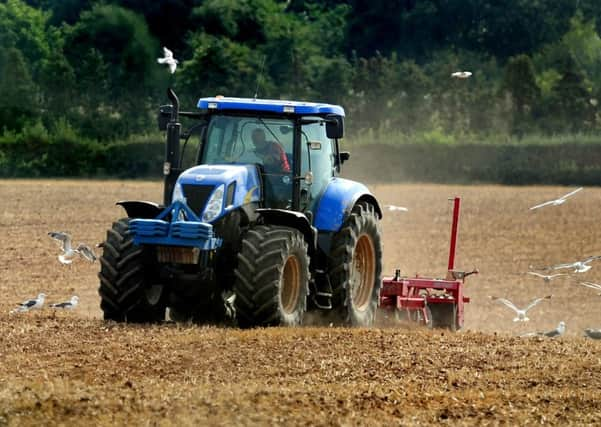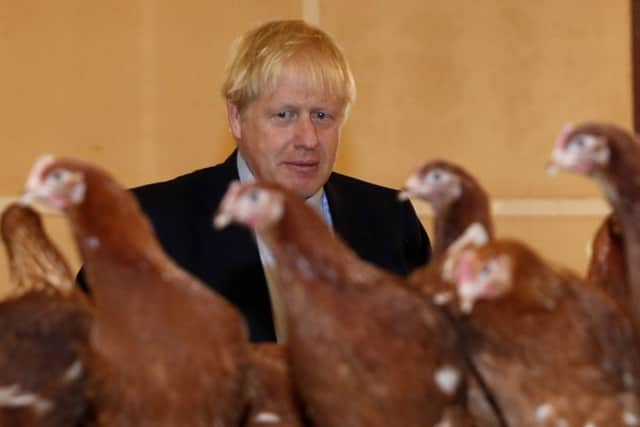Why farmers are the true champions of Earth and not a threat to the environment – Andrew Vine


“There’s me thinking I was the guardian of this land,” he said. “Turns out instead I’m destroying the planet.”
Advertisement
Hide AdAdvertisement
Hide AdHe was speaking after last week’s report from the United Nations urging the world to eat less meat and switch to vegetables because the methane emitted by livestock is contributing to global warming.


Here we go. Another looming challenge for farmers which they need like a hole in the head.
The East Yorkshire sheep farmer is undoubtedly a guardian of the landscape in which he lives and works, as was his father before him.
Advertisement
Hide AdAdvertisement
Hide Ad

But as surely as night follows day, he sees a time coming when the debate over global warming and what to do about it turns against agriculture. The UN has fired the starting gun on this by accusing farmers of degrading the land and consequently making it less able to absorb carbon.
If odds were available at a bookies, I’d put money on farmers at some point being targeted by the more militant category of eco-warriors.
Instead of sitting down on city centre roads to block traffic as the Extinction Rebellion protesters did in Leeds last month, they’ll be picketing farm gates or livestock markets, pointing accusing fingers at the men and women on whom we depend for the food on our tables.
Advertisement
Hide AdAdvertisement
Hide AdOur farmers should not be demonised for doing just that, especially not here in Britain where they operate with infinite concern for the environment. It is absurd of the UN to attack agriculture whilst doing little or nothing to challenge the world’s most blatant polluters like China, India, Russia, Brazil or the United States about their massive carbon emissions.
But that’s too difficult, given their economic clout and stubborn adherence to coal-fired power stations. Far easier to have a go at agriculture, in the knowledge that civilised democracies like Britain will have their consciences pricked by any suggestion that they are not doing enough to combat global warming.
Nobody with any sense quibbles with the science, nor disagrees with the urgent need to tackle the existential environmental dangers facing every country, but a balance surely has to be struck in which farmers, who are the custodians of the land, are seen as part of the solution rather than part of the problem.
Our farmers operate to the highest standards to produce food safely and responsibly. Recent years have seen more of them partnering conservation organisations such as the RSPB to maximise environmental protection.
Advertisement
Hide AdAdvertisement
Hide AdIncreasing numbers are also involved in local or regional supply chains, which means minimising food miles, and the emissions from transporting their produce.
They have done everything asked of them since the end of the Second World War, namely providing a reliable source of wholesome, affordable food.
And to target agriculture for criticism now, when the food it produces may be even more important to the nation if there are problems with imports in the wake of Brexit, feels especially wrong.
It is a matter of personal choice whether consumers change their diets to cut down on meat, or stop eating it altogether, but what must not happen is that the Government targets farmers in any way to discourage them from producing it as part of efforts to reduce Britain’s emissions.
Advertisement
Hide AdAdvertisement
Hide AdNor should there be any form of punitive taxation on meat to push consumers into diets that rely more heavily on plants.
And instead of criticising farmers, the UN should have focused its attention on something else in its report – the problems being caused by wasted food.
Up to 30 per cent of food is wasted, and this accounts for up to 10 per cent of greenhouse gas emissions.
Now this is something that can be tackled on an everyday basis by consumers and the food industry alike, with benefits to both as well as to the environment.
Advertisement
Hide AdAdvertisement
Hide AdTailoring supplies more closely to demand by supermarkets, and cutting down on offers that encourage shoppers to buy more than they need, only to throw it away because a use-by date expires, should not be difficult.
Extending those dates could also be done without affecting the safety of a lot of food. Supermarkets err on the side of caution when setting best-before dates, and consumers run scared of them, often dumping produce instead of trusting to common sense.
Nor should it be a problem to nudge people towards changing their shopping habits, not least because buying less will save them money.
And farmers, of course, will play a full part in efforts to cut down on waste. If they are asked to improve storage to make food last longer, they will do it. For they are, without question, champions of the Earth, not its destroyers.